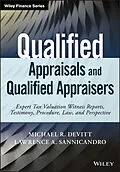Decode IRS appraisal regulations and find practical solutions to current issues
Qualified Appraisers and Qualified Appraisals provides clarification on complex IRS guidelines, and offers solutions and insight that can help appraisers adhere to the latest Treasury Regulations concerning appraisals submitted in tax matters. From the Uniform Standards of Professional Appraisal Practice to IRS regulations, this book explores the body of law that has arisen around the production of "qualified appraisals" that the government and courts will accept. The discussion covers estate, gift, charitable contribution, income taxes, and more, with expert guidance on the interpretation and application of complex regulations. As appraisers often are called upon to provide expert testimony in court, this book shares effective methods including the novel "hot-tubbing" technique that eliminates the appearance of bias in favor of a less-adversarial discussion. Cases are dissected as they relate to application of existing appraisal laws, and the companion website features checklists, references, and additional cases as they become available.
The IRS regulations on qualified appraisers and qualified appraisals have sparked a storm of controversy, and have raised more questions than they have answered. This book acknowledges the problems and offers solutions to help appraisers produce work the IRS and courts will accept.
* Understand the laws surrounding "qualified appraisals" and "qualified appraisers"
* Gain insight on testifying as an expert, including new techniques
* Explore solutions to common issues the IRS raises with respect to qualified appraisals and qualified appraisers
* Examine cases that illustrate the nuances of appraisal law application
In order for an appraisal to satisfy the government, an appraisal must be performed by a "qualified appraiser" specific for the type of property in question. This broad statement leaves much to question, but Qualified Appraisers and Qualified Appraisals provides the answers appraisers need to comply with the law and produce work that meets the latest standards.
Autorentext
MICHAEL R. DEVITT, CPA, JD, MS, is Professor-in-Residence at the University of San Diego Law School. He was managing partner of a law firm where he practiced complex civil litigation in various jurisdictions around the U.S. and lead counsel in several high-profile cases dealing with fraudulent financial reporting, which have resulted in hundreds of millions of dollars in combined recoveries. He is a frequent lecturer on evidence, financial reporting, accounting, litigation, ethics and other topics.
LAWRENCE A. SANNICANDRO, LLM, JD, MBA, is a tax controversy and litigation attorney with McCarter & English, LLP. He regularly represents clients in audits before the IRS Office of Appeals, and in litigation before the United States Courts of Appeals, the United States Tax Court, the United States Court of Federal Claims, and United States District Courts. Prior to entering private practice, Mr. Sannicandro served as a law clerk for the United States Tax Court, and before that, as an attorney for the IRS. Mr. Sannicandro has written extensively on tax practice and procedure.
Inhalt
Foreword by Shannon P. Pratt xvii
Foreword by Jay E. Fishman xix
Preface xxi
Chapter 1 Tax Valuation and the Necessity for Expert Appraisals 1
Summary 1
The Need for Valuation Experts 1
Valuation in Tax Reporting 2
Valuation in Tax Litigation 3
Valuation in Business and Familial Matters 4
Valuation Calculation Standards 4
Fair Market Value Defined 5
Implied Assumptions 6
Cash Value and Market Value 7
Computing Fair Market Value 7
Step 1: Calculating Net Asset Value 8
Step 2: Applying Discounts and Premiums 9
Common Tax Appraisal Reports 9
Appraisal Reports to Support Tax Reporting Positions 9
Appraisal Reports to Support Tax Litigation 10
Proliferation of Litigation 10
Conclusion 11
Chapter 2 Qualified Appraisal 12
Summary 12
Defining Qualified Appraisal 12
Situations in Which a Qualified Appraisal May Be Required 13
Qualified Appraisal Requirements for Charitable Contribution Deductions Context 14
Requirements 15
Legislative History 16
Statutory Definition of a Qualified Appraisal 18
Regulatory Definition of a Qualified Appraisal 18
Requirement 1: The 60-Day Requirement: Treas. Reg. § 1.170A-13(c)(3)(i)(A) 19
Requirement 2: The Qualified Appraiser Requirement: Treas. Reg. § 1.170A-13(c)(3)(i)(B) 19
Requirement 3: The Substantive Requirements: Treas. Reg. § 1.170A-13(c)(3)(i)(C) 20
Requirement 3.1: Property Description: Treas. Reg. § 1.170A-13(c)(3)(ii)(A) 20
Requirement 3.2: Tangible Property: Treas. Reg. § 1.170A-13(c)(3)(ii)(B) 21
Requirement 3.3: Date of Contribution: Treas. Reg. § 1.170A-13(c)(3)(ii)(C) 21
Requirement 3.4: Terms of Agreement: Treas. Reg. § 1.170A-13(c)(3)(ii)(D) 22
Requirement 3.5: Identifying Information of the Qualified Appraiser: Treas. Reg. § 1.170A-13(c)(3)(ii)(E) 23
Requirement 3.6: The Qualifications of the Qualified Appraiser: Treas. Reg. § 1.170A-13(c)(3)(ii)(F) 24
Requirement 3.7: Statement of Preparation for Income Tax Purposes: Treas. Reg. § 1.170A-13(c)(3)(ii)(G) 24
Requirement 3.8: Date(s) of Appraisal: Treas. Reg. § 1.170A-13(c)(3)(ii)(H) 25
Requirement 3.9: Appraised Fair Market Value: Treas. Reg. § 1.170A-13(c)(3)(ii)(I) 25
Requirements 3.10 and 3.11: Valuation and Basis Used to Determine Fair Market Value: Treas. Reg. §§ 1.170A-13(c)(3)(ii)(J) and (K) 26
Requirement 4: No Prohibited Fee Arrangement: Treas. Reg. § 1.170A-13(c)(3)(i)(D) 27
The Qualified Appraisal Requirement and Pass-Through Entities 27
Interplay of the Qualified Appraisal and Appraisal Summary Requirements 28
Litigation Concerning Qualified Appraisals 29
Conclusion 29
Chapter 3 Qualified Appraiser 31
Summary 31
Legislative History 31
Statutory Requirements 32
Statutory Requirement #1: Appraisal Designation or Certain Minimum Education and Experience Requirements 33
Statutory Requirement #2: Regularly Performs Appraisals for Compensation 34
Statutory Requirement #3: Verifiable Education and Experience 34
Statutory Requirement #4: Not Prohibited from Practice by 31 U.S.C. § 330(c) 34
Regulatory Requirements 35
Appraiser's Declaration 35
Regulatory Requirement #1: Declaration That Individual Is an Appraiser: Treas. Reg. § 1.170A-13(c)(5)(i)(A) 36
Regulatory Requirement #2: Declaration That the Appraiser Is Qualified to Value the Property: Treas. Reg. § 1.170A-13(c)(5)(i)(B) 36
Regulatory Requirement #3: Declaration That the Appraiser Is Not an Excluded Person: Treas. Reg. § 1.170A-13(c)(5)(i)(C) 36
Regulatory Requirement #4: Declaration That the Appraiser Understands Consequences of Fraudulent Valuation: Treas. Reg. § 1.170A-13(c)(5)(i)(D) 38
Additional Declaration Requirements of Notice 2006-96 38
Denial of Appraiser Status 39
Appraisals by More than One Appraiser 40
Appraisal Fees 40<...
